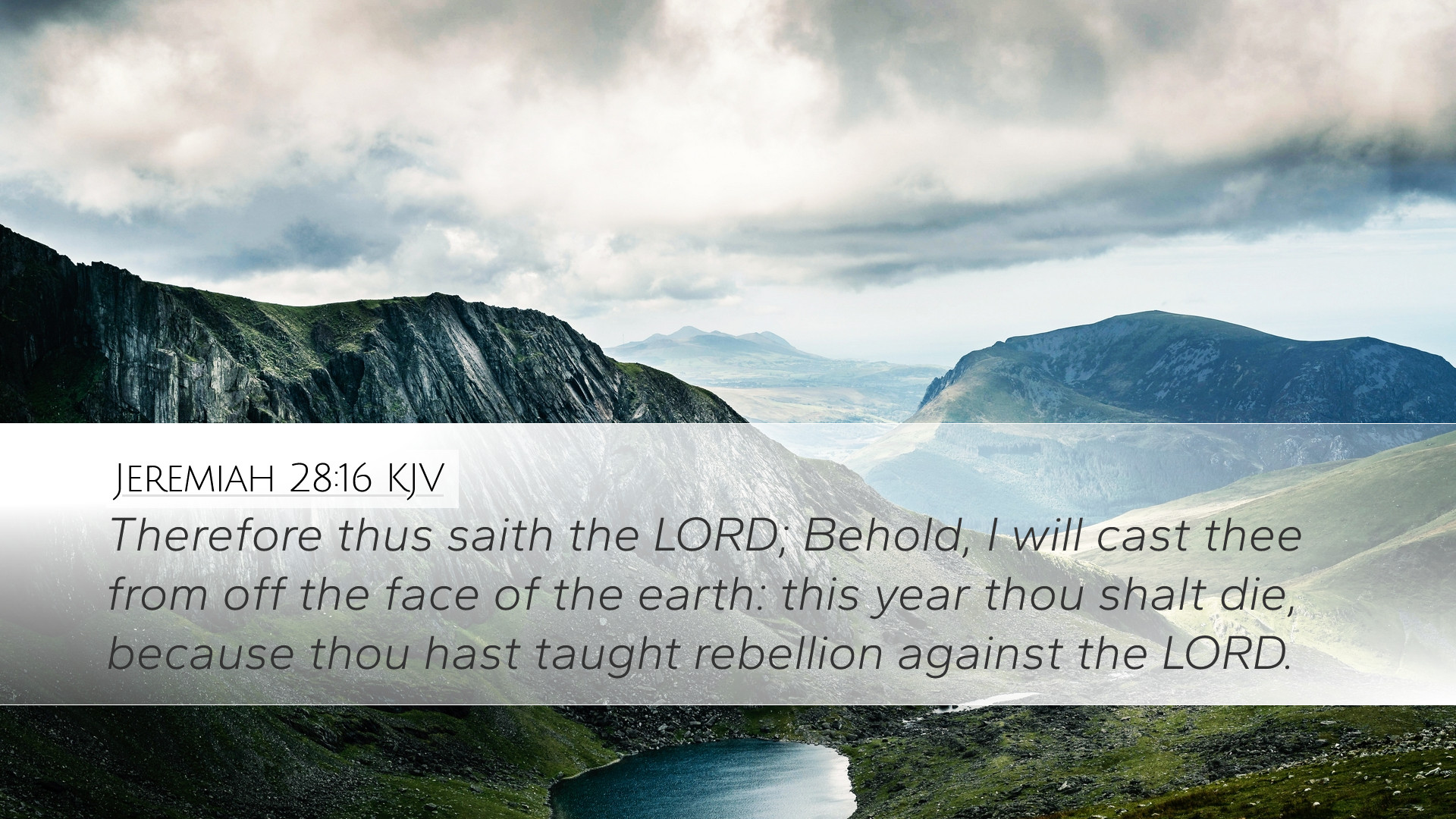Commentary on Jeremiah 28:16
Jeremiah 28:16 states:
"Therefore thus says the Lord: Behold, I will cast you from off the face of the earth. This year you shall die, because you have taught rebellion against the Lord."
Overview
This verse comes from a pivotal moment in the prophetic ministry of Jeremiah, specifically in the context of his confrontation with Hananiah, a false prophet. The message Jeremiah conveys is a dire prophecy about the consequences of false teachings and the significance of divine truth in the context of Israel's fate. The response from the Lord through Jeremiah carries a weighty warning and serves as a reminder to the people of the importance of obedience to divine commands.
Contextual Analysis
Historical Context: This prophecy occurs during the reign of Zedekiah, when Judah was in a state of turmoil, facing Babylonian invasion. Jeremiah had been proclaiming warnings about the impending judgment upon Judah for their sins and unfaithfulness to God. In contrast, Hananiah declared that the yoke of Babylon would be broken and that the captives would soon return, which appealed to the people's desires for hope and restoration.
Literary Context: The passage is part of a broader narrative where Jeremiah serves as a mouthpiece for God's truth, contrasting sharply against Hananiah’s deceptive optimism. This prophetic opposition highlights the absolute authority of God’s word versus the fallibility of human predictions.
Theological Implications
This verse presents several theological themes pertinent for scholars and theologians:
- The Authority of God’s Word: Jeremiah’s prophecy underscores that God's declaration holds ultimate authority over human pronouncements. It stresses the seriousness of proclaiming falsehoods in God’s name.
- Consequences of Disobedience: Hananiah's rebellion is met with a direct consequence: death. This serves as a sobering reminder that God does not overlook those who mislead His people.
- The Nature of Prophetic Ministry: The conflict between Jeremiah and Hananiah showcases the sometimes lonely and perilous path of true prophets who must often stand in opposition to popular sentiment in their society.
Commentary Insights
Matthew Henry’s Commentary
Matthew Henry emphasizes the importance of divine justice and the seriousness of leading others astray. He notes that the death sentence pronounced on Hananiah serves to demonstrate that God will not allow His name to be dishonored by false prophets who preach rebellion against His commands. Henry reflects on the broader implications of this event, suggesting that God’s faithfulness to His word includes the fulfillment of both blessings and judgments.
Albert Barnes’ Notes on the Bible
Albert Barnes points out the significance of the phrase "taught rebellion," highlighting that Hananiah not only proclaimed falsehoods but actively encouraged disobedience among the people. Barnes draws attention to the immediacy of judgment, indicating that Hananiah’s demise would not come as a distant future event but within the same year. This serves to illustrate the swift justice of God against those who undermine His authority.
Adam Clarke’s Commentary
Adam Clarke provides additional depth by examining the character of Hananiah. He identifies Hananiah's motivations and the broader cultural pressures that could lead someone to offer false hope. Clarke emphasizes that Hananiah's demise serves both as a lesson to false prophets and as a warning to the people of Judah about the perils of trusting in human leaders over divine leadership. He also discusses the implications for their understanding of God’s covenant and fidelity.
Applications for Today
The themes found in Jeremiah 28:16 have profound applications for modern believers, pastors, and theological study. Key takeaways include:
- The Call for Discernment: In an age of competing voices within and outside the church, discerning true from false teaching remains critical. Believers must be vigilant and anchored in scripture.
- The Consequence of Leadership: Church leaders and teachers bear a weighty responsibility before God. This passage serves as a sobering reminder that they will be held accountable for how they lead others.
- The Hope in Divine Justice: Believers can find comfort in the fact that God’s justice ultimately prevails. When faced with injustice or false teachings, Christians can trust in God’s righteous judgment.
Conclusion
Jeremiah 28:16 encapsulates a profound moment in the prophetic narrative, highlighting the stark contrast between divine truth and misleading human assertions. Through this scripture, believers are called to uphold the integrity of God’s word, to exercise discernment in their spiritual leadership, and to trust in the ultimate sovereignty of God in times of trouble. The insights from historic commentaries enrich our understanding of this text, reminding us of its timeless relevance within our faith journey.


